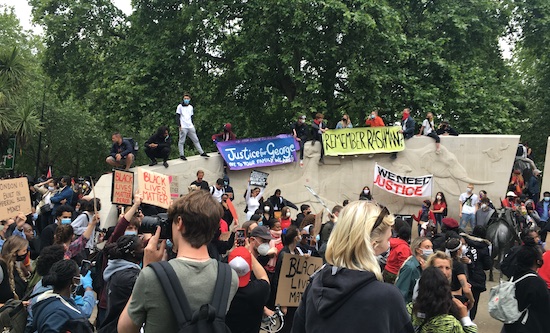
In mid-November, former Prime Minister Gordon Brown told Boris Johnson there was a threat of ‘rebellion across the country’ as racial and income inequality worsened, and the government continued to offer pittances and dangerous, contradictory advice in the midst of the coronavirus pandemic. In June 2020, SAGE member Professor Clifford Scott claimed that Britain could see ‘serious public disorder’ in the near future. He correctly predicted that the poor would be hit worst by the pandemic, that poorer areas would be more harshly policed, leaving the country a ‘tinderbox’ of potential uprisings. LEE GHALEM reports.
The British ruling class have taken this advice. As their relentless attacks on the working class continue, the past few months have seen a series of repressive measures implemented to pre-empt and crush resistance.
In September, the Department for Education (DfE) issued guidance to head teachers calling anti-capitalism an ‘extreme political stance’, tantamount to terrorism, anti-semitism, and illegal activity. The guidance stated that ‘schools should not under any circumstances use resources produced by organisations that take extreme political stances on matters […] even if the material itself is not extreme, as the use of it could imply endorsement or support of the organisation’. In response to widespread criticism, the schools minister claimed the guidance would still allow for a curriculum that ‘reflect[s] a diversity of views and backgrounds’ – of course this means a diversity of views which pose no threat to the ruling class. A further defense of the authoritarian edict was that the Education Act of 1996 lays out a duty by schools to maintain political impartiality; to the British government, impartiality means political bias in favour of capitalism.
Another political attack wormed its way into schools on 20 October, this time aiming to shut down teaching on ‘critical race theory’ – the study of structural racism within society. Until the debate over critical race theory hit the House of Commons in late September, it was a marginal topic in British politics. In the US earlier that month, however, Donald Trump ordered federal agencies and contractors to stop funding training programmes that drew on ‘race-based ideologies’, and the Republicans attacked critical race theory. In the same month, the British government came to the conclusion that for teachers to ‘teach their white pupils about white privilege’ would be breaking the law, as would ‘promoting partisan political views such as defunding the police without offering a balanced treatment of opposing views’. This repressive standard is intended only to be applied to anti-racists and anti-capitalists.
This derision of critical race theory came after anti-racist protesters had taken to the streets in international solidarity with US protests after the racist murder of George Floyd by Minneapolis police, and in response to the racism of the British state itself. The government has been unequivocal on their stance: resistance is dangerous, and anti-capitalist and anti-racist ideas are threatening enough to the ruling class to warrant political attack and censorship.
Tim Davie being appointed the new BBC director general on 1 September was another part of these reactionary pre-emptive strikes. As with the DfE, the BBC’s new watchword is false ‘impartiality’. Guidance to BBC staff released 22 October warned against political bias to such a strict extent that, in Davie’s own words, ‘it should be assumed that most marches are contentious to some degree or another’, and news staff would likely not be allowed to attend LGBT pride parades, regardless of whether they were marching under the BBC’s banner or not. After receiving backlash for this, Davie hastily reassured the public that pride marches would be allowed under normal circumstances, but that journalists must not be seen ‘taking a stand on politicised or contested issues’; that they must ‘use their own judgment’ when it came to Black Lives Matter and climate activism, but that the rules of impartiality still applied. The guidance also forbade ‘virtue signalling’, using emojis that could hint at an opinion on political matters, and liking posts on social media that could be seen as controversial or as expressing a political opinion. An outrageous double standard lies just under the surface: in order to avoid controversy, BBC staff must take care to never criticise the government or be seen to have any stance outside the accepted BBC narrative — which is, of course, in support of British capitalism.
In the House of Commons, both Labour and the Conservatives were instrumental in passing the Overseas Operations Bill. It was brought to the House by Johnson’s team and puts various barriers in place to prosecuting troops for alleged war crimes overseas, up to and including torture and murder. The Conservatives overwhelmingly voted in favour. Labour MPs were whipped to abstain – only 18 Labour MPs defied the whip and voted against the bill, of whom three were sacked from their positions as parliamentary private secretaries. This legislation goes hand in hand with the Covert Human Intelligence Sources (Criminal Conduct) Bill, approved in October, which authorises MI5, police, and other state authorities to commit crimes while undercover, including rape, murder, and torture. On 19 November, when the government announced its £16.5bn military spending spree, the Tories also cut £4m from funding for bullied LGBT+ school children. Starmer and his most loyal opposition offer no resistance to this rabidly reactionary ideological onslaught.
The ‘tinderbox’ of racial and wealth inequality is ready to ignite and the ruling class are attempting to curtail resistance before it can even begin. The government are drafting the armed forces in to handle what Johnson called a ‘quadruple crisis’ of coronavirus, flu, Brexit and flooding this winter. It remains to be seen what other measures the British ruling class will attempt to push through before the working class are no longer willing to stand their repression.




